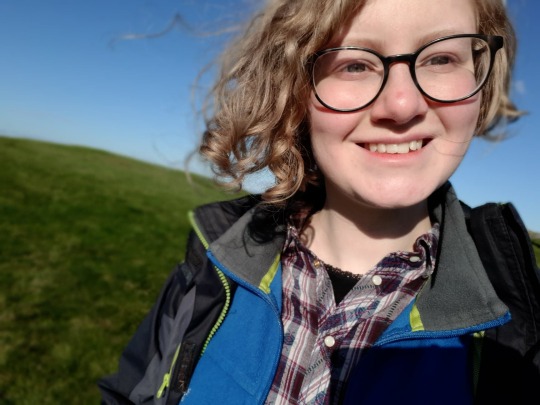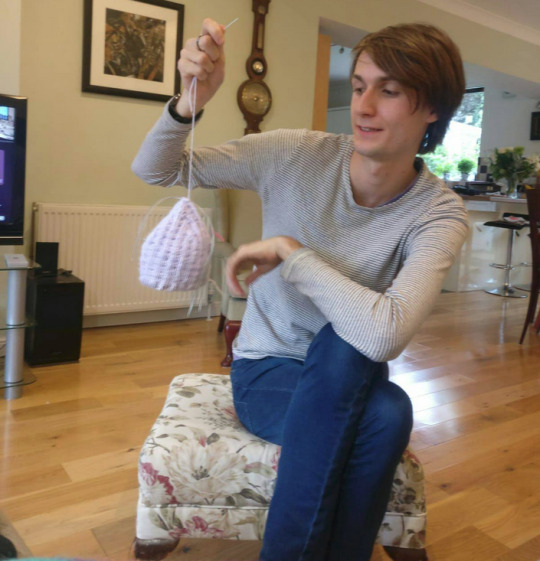#we need to start up some kind of social science student crafting club
Explore tagged Tumblr posts
Note
I saw your pattern because people were talking about sewing masks, but honestly the accompanying sociology research is cool as hell, and I'm really looking forward to whatever of your developing work you share on tumblr. I'm also a social science PhD student, and I really hope you can get, like, what, retroactive IRB clearance to include this in your dissertation.
Thanks! Normally my honours thesis would have been put online through the university, but they did some school structure changes in the last couple of years and they are still trying to sort out what is going where in the archives now that Sociology is with the humanities now. I am aiming to get a version of it published in Transformative Works and Cultures, which is open access, but that might be getting pushed back what with everything that is going on.
As for ethics clearance, who knows? I had to jump through all sorts of hoops for honours because my research technically involved asking people to confess to what could potentially be crimes (although once you dive a bit deeper, the only one that is definitively illegal is the scanning and either uploading or reprinting of a digital or physical pattern in such a way that it deprives the author of potential income). Also, because I had respondents from all over the world my research was double-high-risk, because the uni worries abut that sort of thing. I have no idea how they would feel about this sort of thing.
15 notes
·
View notes
Text
A Promising Encounter
Timing: A few months back
Parties: @professorbcampbell and @sasha-r-blog
Location: University campus cafe
Summary: Sasha��s advisor sets up a meeting between her and Professor Campbell to discuss her academic career. Ben sees promise in her.
Content: Allusions to manipulation
“I think it would be good for you to meet with one of the faculty mentors. It doesn’t have to be a regular occurrence, but if you try it you might find something of value. Maybe ideas for ways to get involved on campus, or suggestions of ways to make your major feel more worthwhile to you. Or maybe a way to take a more interdisciplinary approach to your academic career. A lot of students find branching out helps them to get a fuller experience at the university. I’ll put in an appointment for you with one of them. I wouldn’t want you to go into your second semester still not feeling settled when there are options that may help.”
Sasha gripped the shoulder strap of her school bag so tight her knuckles were turning white. Why had she agreed to this? She could have just said no to her advisor and wouldn’t have had to deal with any of this today. But now she was standing near the entrance of the on campus cafe, halfway to a panic attack. She could have just said no, but instead she just sat there across from her advisor as she droned on at her, nodding like an idiot at being signed up for this when she really wanted nothing to do with it. It wasn’t like her advisor’s suggestion was dumb, it was just that now Sasha had to walk into public space on campus and meet with a stranger that she couldn’t even remember the name of. Professor Candle or Combbull or something.
She took a shaky breath. She probably looked like a weirdo for lingering at the entrance, foot tapping and sweating under her sweater. It was hard to tell if she was imagining the people leaving giving her weird glances and giggling, but she quickly rushed in after they passed. It wasn’t even that crowded, no rush of students grabbing coffee and bagels between classes at the moment. But there was still a decent amount of seats filled, mostly people chatting with each other or working alone on their laptops. Oh great, right, she didn’t even know what this professor looked like. Sasha awkwardly walked over to the side, avoiding the questioning glance of the barista who was probably expecting her to order something. This was the worst. Either this guy was waiting for her here and she was just looking around like an idiot, or he hadn’t even arrived yet and Sasha was still looking around like an idiot. Maybe she’d be lucky today and the professor messed up his schedule and couldn’t even make it. She’d give it 10 minutes. That was fair right? Then after that she was legally allowed to bail.
Looking at his watch, Ben shut off his computer and pulled on his wool overcoat. The beginnings of snow had started to drift down on the campus, which was a bit of a nuisance. Ice and freezing temperatures complicated his affairs. But, Yule was nearly upon them and he was looking forward to gathering with the rest of his family to celebrate the occasion with hot chocolate and human sacrifices. Maybe his sister in law would break out the mulled wine-- that would be a treat. Ben took his time as he walked towards the campus coffee shop. He was in no hurry to meet this new student. He’d looked up her records when one of the advisors had asked if he had any availability in his schedule to meet with a “brilliant but flounder” student. Of course, how could he say no? Smiling at one of his former TA’s as he walked across the campus, Ben sighed. Computer science majors, logical to a fault typically. He doubted he would have much luck with this one, but who knew.
Walking into the coffee shop, he glanced around and saw a fidgeting young girl in the corner. Sasha. That must be her. With a warm smile on his face, Ben offered a polite wave. “Sasha Rodriguez, correct?” He asked, “Apologies for the delay, a lecture ran long. I’m Professor Campbell, but please, call me Ben.”
Unfortunately, within three minutes of Sasha’s countdown to leave, a man walked into the coffee shop and greeted her. Great. Well, yeah, actually great in the sense that she didn’t have to awkwardly stand here anymore unsure who she was supposed to meet. Sarcastic “great” at the fact that she wasn’t getting out of this social interaction any time soon.
“Hi, yes, that’s me,” Sasha said, giving a small wave toward the professor before realizing that was probably unnecessary and dumb. “My advisor said we were supposed to meet for a mentoring...thing. I guess we should sit down somewhere?”
Luckily the area Sasha had tucked herself into while waiting had a free table only a few feet away. Sasha took her backpack off and sat down, half wanting to keep it on her lap, it’s weight somehow comforting. But she decided against it. This would just be talking, which didn’t exactly make her feel any better, but reminding herself that talking to someone new wouldn’t kill her was important. Most shy kids she knew growing up were at least teacher’s pets to balance out the lack of friends, but she had never even managed that. Peers, teachers, strangers, all fair game for her nerves. But she could handle talking to him for a bit. At least her anxiety was easing a little now that she didn’t have to wonder about the unknown of when and who she was meeting. With a nod, Ben gestured for her to grab a table. “That sounds like a wise idea. You hold tight, I’ll get us some coffee.” He said and left to go to the barista. With his trademark smile, Ben ordered an americano and a drip coffee and collected the drinks at the end of the bar. “I wasn’t sure what you preferred, so I thought it’d be safest to go with a black coffee.” He said, setting the mug in front of the girl. “So. Sasha. It’s good to meet you-- please, don’t think of this as any kind of interview or lecture or anything like that. I’m here to act as a sort of liaison between you and the faculty here. And, to offer you a warm White Crest welcome. Go Moose!” Ben said with a very “ra-ra” gesture of his hand. It was an act, crafted over the years to inspire confidence and ease the nerves of some of the more anxiety ridden students. “How are you finding the university so far?”
Sasha nodded, watching as Professor Campbell, or Ben she guessed, ordered the drinks. Right, probably best to actually drink coffee at the coffee shop. It was a campus location, but that didn’t mean that they wouldn’t get annoyed looks if they spent time here without ordering something.
As Ben handed her the drink Sasha mumbled out a quick thanks, taking a sip before remembering to respond with more. “Um, yeah, black coffee’s fine. That’s what I usually have.” Adding milk would have just made her stomach mad at her, and adding sugar didn’t really seem to do anything to the taste. She wasn’t really sure why people added it in the first place. Taking another sip, she realized how sorely she needed the coffee. Maybe that’s part of why she was so on edge. Sasha hadn’t been a big coffee drinker before coming to college, but it was quickly becoming a staple with all her late night patrols as The Claw. She read once that coffee could actually make people more anxious or something, but right now it was giving her stressed and tired brain a much needed jolt.
“Thank you,” she said, smiling slightly at the little “ra ra” hand gesture. She hadn’t been sure what to expect, but she was glad that Ben didn’t seem like some of the other professors she had met this semester; harsh gazes and even harsher deadline, rambling so fast Sasha couldn’t keep up, or dully reading off their lesson plans and then slipping away after the class as if they had never even existed.
“It's going alright so far, I think. I’m not doing the best in some of my classes but, um, I don’t know, I guess otherwise things are fine.” That was the thing, what did Sasha do besides classes? She had barely gotten to know anyone on campus, peer or otherwise. She had managed to avoid almost every campus event out of tiredness or busyness or anxiety. It wasn’t like she was in any clubs either. Sasha tapped her fingers across the side mug. She really must look like a loser for that, but then again, that wasn’t exactly a surprising turn of events. She had The Claw, that’s what she did, so why did she need to try to do stuff on campus besides not flunk out?
“I don’t really do much here.”
“Excellent. And, you’re quite welcome.” He said with an encouraging nod. Regarding the girl over the rim of his coffee mug, Ben took careful stock of her body language, her general demeanor. She seemed nervous, but that was normal amongst the new undergraduate students, even the ones that claimed to be adjusting well. Ben took a sip from his cup as she quietly explained her situation. Struggling in class, an advisor mandated meeting with one of the mentor teachers to ease her into the life of collegiate life? How interesting. Interesting indeed. “I think there’s always a certain amount of an adjustment period to be expected with grades,” Ben said, because that’s what the understanding professor would say. That’s what someone who didn’t expect greatness from his students would say. “So I wouldn’t let that bother you very much, as long as you’re enjoying the classes you’re in. College is a transitionary period, there are always going to be bumps in the road whenever these things happen.”
She tapped her fingers on the mug-- an irritating habit that Ben ignored. Hopefully someone would be able to drill that out of her, it wasn’t very polite. “What about extracurriculars? Are you living on campus? Have you gotten to know some of your classmates? There are all sorts of clubs offered by the student body, I know more than a few students who have found their niche in one club or another.”
“Yeah, classes are good. I like them.” It wasn’t a complete lie, Sasha didn’t hate her classes. But whatever she thought she was good at when it came to math and coding and tech didn’t apply much here. And when it did it was the basic stuff in classes that made her eyes glaze over and excuse herself to the “bathroom” just to walk up and down the hallway to wake herself up.
She nodded along to what Ben said about it being a transitionary period, but as he continued on with more questions she froze up a bit. “Um...not really. I mean I don’t really do much on campus. I’ve seen flyers around and I know they have activity fairs and stuff like that, but I’ve never gone.” Sasha nervously picked at a hangnail. Boy, the flap of skin sure was way more interesting than looking back at this professor who was probably exasperated at her lack of involvement. “I live on campus, so I know I don’t really have an excuse, but like I said, I don’t really do anything here. I just sort of do my own thing. Alone.”
“What classes are your favorite?” Ben asked conversationally, leaning back in his chair, one leg folding over the other as he watched the girl with an appraising eye. “I’m sure you must enjoy our coding classes-- I’ll admit, I’m not very familiar with the faculty in that department, but I’ve heard good things from some of the other students I mentor. They’re on the engineering track, though, I’m not sure if you’d have much overlap with them.” He said.
Noticing the sudden “deer in the headlights” expression on her face, Ben noted to ease up on the questions. Some students thrived off them, Sasha clearly wasn’t one of those. Fair enough, he could work with that. “That’s perfectly alright-- college can be incredibly overwhelming when you first arrive.” He said, tone gentle. He watched her pick at her nails with increasing distaste. Disgusting. But, he didn’t let the annoyance show on his face. Instead, he cast a sympathetic smile in her direction. “And there’s nothing wrong with being alone. That said, college is a time for meeting people, making friends. I’m sure I’m not the first person to tell you this, so I’m apologizing in advance for sounding like a cliche. But, some of the best friends I’ve had I met in college. You’ll never know who you’ll meet unless you put yourself out there.” He said with an encouraging nod.
Sasha hadn’t expected the professor to seem so casual about her lack of involvement, though she supposed that wasn’t that surprising. In her anxiety she thought maybe this meeting was some last ditch faculty intervention thing where Ben would shake his head and tsk tsk at her and explain how Sasha was going to ruin her college experience by being so much of a loner.
Her shoulders eased slightly, more tension leaving as she reminded herself that this was just a meeting with some random professor and even if he gave her a list of clubs it wasn’t like he could force her to go. She had been in college long enough now that she knew, for better or for worse, if she didn’t want to do something like go to class or take a professor’s advice she didn’t have to. But it was nice that Ben didn’t seem like the type so far to be a jerk about it.
“I mean, I like this one class, Scientific Simulation and Modeling. It is for one of my Gen Eds but it fits into my whole major and the professor makes it pretty fun. We were mostly doing simulations for regional ecology and wildlife population stuff, and that was kinda cool. I’ve really only taken math and computer classes this semester. I know I need to do all the other Gen Eds but besides English 101 I haven’t really thought about what to do for that. I haven’t looked into engineering classes, but I’m sure some of them might overlap with what I need.”
Still, even if Ben was being nice, Sasha couldn’t help but wonder how much he really cared about her major or anything else she was saying . He apparently wasn’t part of the department most of her classes were in, and Sasha assumed most professors didn’t spend time outside of their own academic circle. But Ben seemed to watch intently in a way that made Sasha feel like maybe he was actually interested in listening, even if she decided to ramble on about the model the class worked on for trout populations in the local rivers or how she was kinda proud she got an A on her last Trig test when she had been hovering around a C all semester. She wasn’t going to though, even she didn’t care that much about her classes to talk about specifics. And she knew painfully well if she did talk too long about her interest most people just thought she was weird.
“I’ve never really been away from home or alone so I guess it is pretty weird to get used to. Alone without my parents I mean. But I mostly hung out by myself back home too so that isn’t really much of a change. I uh, I mean, I hear that a lot, the whole thing about making close friends in college. I’m sure it is true for most people but...”
God, she must sound like such a sad sack. After she took another sip of coffee she tried her best to change the subject.
“But I haven’t really had luck. Anyway, uh, what department do you teach in then?”
Ben barely paid attention as she rattled on and on about whatever silly little class had captured her interest. It seemed like some kind of scientific class, one he was entirely unfamiliar with. Which hardly made her the ideal candidate for his little club-- hardly any of his carefully cultivated minds were on the science track. But, she could be useful yet. Hrv’Shtooooor didn’t care how long it took him to find fresh blood, only that he did. Smiling and nodding at the appropriate intervals, Ben took a sip from his coffee cup. “Have you talked to the professor at all about other courses they teach? I know more than a few of my own students helped settle on their degree tracks because of influential teachers. Not--” He added with a deliberately rueful smile, “only myself, of course. But, that could be a good starting point as far as finding common interests with others or exploring new paths.”
“People take things at their own pace.” Ben said with an assured nod. So she was a loner. Interesting, very interesting. That boded well. The desperate and the lonely made for easy targets, though the science minded had always been a harder nut for him to crack. He relished a challenge, though. At her question, he cast her a polite smile as she settled back in his chair, one leg folded over the other. “I’m a Professor of the Classics, so I’m with the School of Arts and Sciences. Not classic literature, mind you,” He said lightly, though the misconception continually irked him. As if he cared about Bronte, Austen, Fitzgerald, or any of the rest of their ilk. “I teach Greek and Roman antiquity. Politics, philosophy, history, literature, and so on. It’s a dull field, but I find it quite enjoyable.”
“I probably should, I barely know what my plan for next semester is. But I guess if a professor teaches one good class hopefully their other ones are good too.” Again, she should probably put more thought into this, considering how much she was paying for school. But maybe Ben was right. Going at her own pace, figuring it out bit by bit, couldn’t be that much of a disaster, right? She hadn’t flunked out her first semester, she couldn’t be that bad.
“So would the classics include myths and things like that?” Politics and philosophy sounded like an easy way for Sasha to fall asleep instantly in class. But myths were kinda cool. She never really looked a whole lot into it, but a lot of those greek heroes felt like old timey superheroes. She sure as hell wasn’t going to mention that to the professor though. There had to be a limit to how kind he could be, and she doubted comparing years of studies to comic books was going to make him happy.
“I don’t really know if I really get a lot of that stuff, but it sounds cool. It covers a lot of stuff it sounds like.” She was surprised he was calling his own field dull, it made her reflexively want to disagree, even if half of what he listed did sound boring to her. Maybe it was just the idea that someone could spend years doing something and people would still think it wasn’t worth much. It made her vaguely sad. She knew first hand that it sucked to care about something a lot when plenty of others didn’t.
“That’s the spirit.” Ben said with an approving smile and gestured grandly with his cup. “A positive mindset is a valuable thing. College is all about experiences. And everyone has their own way of going about things. But, it never hurts to venture out a bit, dip your toes in the water, that sort of thing. This school is a small one, all things considered, but I’m sure you’ll find professors-- and peers-- who suit you best.” He said with a kind expression on his face. And he would do his best to steer her towards his own little niche. If she got away, so be it. But, he was a patient man and so was his Lord.
Myths. Of course, that was all anyone could ever talk about. But, he supposed it was easy to be enamored with the stories of ancient times when you didn’t know that some of the so-called myths were alive and well. Nodding, Ben bridged his fingers together, “Yes, we cover the various mythos surrounding both Greek and Roman society, though I typically focus on how they were indicative of the times in which they were written and the religious importance they held.” Leaning forward, he said in a conspiratorial whisper, “But, between you and me? My segment on Hercules is one of my favorite sections. Next to Gilgamesh, he’s one of the greatest heroes in history.” Ben said with a nod.
“Ah, you’re very kind. But, I’ve spent too many hours at conferences led by geriatric old fogeys to delude myself into thinking that what I teach is “cool”.” Ben said, making air quotes with a modest shrug. “That said, it’s my field of choice and I’m always very pleased to see the new generation of historians who are interested in preserving antiquity the way I do.” He said before glancing casually at his watch, a throw away gesture to see how observant she was. Was she the type to notice the subtlety of others actions? Or would she gloss over it?
It would be nice if what Ben said was true, if Sasha could connect with people at the college and feel a bit more at home. Maybe she was just being pessimistic. It wasn’t like she never took risks. Climbing onto icy rooftops and chasing down bad guys wasn’t what most people would call playing it safe. So why was it so hard to just talk to people in comparison?
“I think heroes and stuff like that reflect a lot of things.” Sasha winced slightly at her own words. She wished she could say it in a way that sounded smarter, but she agreed with him. The people others looked up to and wrote about, even if they weren’t real...well, they usually said something about the person who was writing about them, about what they wished for, who they wanted to be. “Are you teaching any classes about that stuff soon? I...honestly I’ve not really thought about my schedule much but maybe I could take one.” At the very least it might fill a history gen-ed or something. There wasn’t harm in trying.
Sasha smiled at Ben talking about not being cool. Sasha wasn’t sure any professor could be “cool” but at least he was complaining about the old-timey professors rather than being one himself. As he spoke Sasha caught him glancing at his watch. Crap, how long had they been sitting here talking? Sasha glanced over at the clock on the nearby wall, worried that looking at her phone would seem rude. She was surprised by how much time had passed. If it felt like just a few minutes ago she was halfway to bailing out of this meeting in the first place out of nerves. “Ah, sorry, didn’t mean to talk so long.”
Ben regarded the girl with an appraising nod. Heroes, hm? Perhaps she was just one of the innumerable students who were obsessed with the Marvel movies that had trickled out of Hollywood over the past decade. But, it was her body language that interested her more. She seemed hesitant, self-critical, anxious. As though her own words couldn’t stand on their own. Interesting. Very, very interesting. With another winning smile, Ben let out a chuckle, “As luck would have it, I am.” It was one of his most popular courses with the undergraduates, how could he not offer it? The course had pulled in more than a few of his most recent… disciples. “I have a course on Greek and Roman literature that focuses quite extensively on the heroes-- and villains-- of myth.” He said earnestly. “It’s open to most degree tracts, but don’t quote me on that. I’m not as familiar with course requirements as I should be.”
Ah, she noticed. Observant, anxious, eager to please, and apologetic. Very good, very good indeed. With a warm smile, Ben stood up and held out a hand for a firm handshake. “No, no, believe me, the pleasure was all mine. I enjoy being able to talk to promising young students like yourself. And do mean that,” He said as he pulled his jacket back on, preparing to walk back out into the wintery street. “You have a lot of potential, Sasha. Don’t let minor setbacks hold you back from that.” With that, Ben strode out of the coffee shop a satisfied expression on his face as he left. Sasha Rodriguez. What a promising young woman indeed.
11 notes
·
View notes
Text
8 Kind Of Extracurricular Activities For Kids- Must Try Them Once

To engage the children in extracurricular activities has become a task, given the distractions available in the form of "Screens" being an easy option.
Extracurricular activities aim to kindle their energy constructively outside their academic curriculum and more importantly, allow them to discover their strengths and inclinations.
It is equally crucial for the parents to help their child deduce his/her interests from the many options available. It begins by offering them all the options and carefully shortlisting the activities your child loves more. It is only so long that your children will choose for themselves.
As dotting parents, you are capable of recognizing the interests of your child. The pre-biased assumption that a flamboyant child will like physical activities and a shy or low-key child might prefer calmer activities is faulty.
Each of the eight activities mentioned below is said to support the development of different physiological and physical characteristics in children.
Music and Dance

Parents cannot stop cheering and smiling while watching their children dance or sing. Tapping their interest in dance/music/instrument is a very notable way to keep them engaged while learning a skill. The children who sing/play instrument/dance, are attested to have promptly gained qualities of emotional intelligence and perseverance. The children from all age groups enjoy the tranquillity effect that music on everyone!
Sports

The spectrum of "Sports" is not limited to stereotypical cricket and badminton only. Any sporting activity that interests your child is a perfect extracurricular activity to keep them physically active. As we all are aware of health benefits derived out of sports in terms of physical health, the catch is to decipher which sport your child interested in. Exhibit options by way of live sports on television, let them explore game accessories suiting their age. Experts suggest every child should atleast participate in one physical sport for developing natural physical strength. Therefore, the onus of recognizing the prefered sport and motivating the children lies with their parents.
Brainstorming Activities

The schooling module is about learning, however, it has the limitations of core-curriculum. Many children may have a curiosity for various quizzes, maths tests, olympiads. It improves their problem-solving skills and academic performance while imbibing leadership qualities. These activities need not be related to study subjects only, such as Sudoko, Number games, Rubik's cube, Coding classes (to know more about coding classes click - Learning), online contests, general knowledge quizzes etc.
Art and Craft

Although arts and craft are considered soft activities, they have a deep-rooted impression on children. An ocean of activities such as drawing, clay craft, pottery, painting & sketching and many such other activities play a very powerful role in shaping one's personality. The recently trending activity of abstract colour pouring painting has broken records of popularity. The concept of arts activities is therapeutic and aids in developing sensory intelligence. Let your children choose their form of arts and give wings to their creativity. The inclination for arts and craft went soaring high during the pandemic lockdown when people enjoyed these activities at home to keep away from stress.
Language and Improvisation

Apart from school subjects, language improvisation is also a great activity for developing communication and social skills. As the children's brain is still developing, it is easier for them to grasp a new dialect. Introducing them to a foreign language at an early age is an excellent opportunity for adding a skill-enhancing activity to their post-school horizon. Being multi-lingual augments the personality to be more adaptable and open to innovation and prepares for extensive prospects for wider future opportunities in life! Letter writing, debate competitions, language quizzes are some of the language-based activities.
Hobbies

Hobbies are the interest-generated activities that a person is naturally inclined to. We are discussing Hobbies as a separate extracurricular activity because it is easier to get them started with, especially in the case of teenagers. Parents don't need to specially motivate or urge them to take it up! Atypical activities such as Cooking, lego structures, Philately, Notaphily, Nature studies, Reading books, have more impacting because the child is self-motivated with the fascination for the hobby. Promoting to take up hobbies develops a sense of discipline and confidence in the children as they feel they are doing something they want to, not something suggested or offered by adults. It is usually observed that children and teenagers choose Chess, Reading, sewing and other non-stereotypical hobbies that calms and relaxes them.
Science clubs

The children who prefer to ask how and why behind every process are usually interested in science and experimenting. Involvement in various science clubs that take along the journey of how and why logic helps to quench the inquisitiveness of children with sound reasons. The structured pathway to learning the universe of science keeps the children interested while rendering benefits like developing logical thinking along, intellectual reasoning skills, awareness of surroundings and alertness. Various clubs are available in live and online versions where the children can learn by relating the experiments with outcomes.
NCC/ Scouting

National Cadet Corps must be the primary choice for extracurricular activities. All children above 13 years of age can enrol for NCC. Life skills, from all spheres of life, are taught to the cadets by participating in real-like life situations. Team management, compassion, physical strength, survival techniques all of such practical approach concerns are addressed and taught here. It means an all-round development of your child and making them ready for the real world in future.
As both urban or rural students are exposed to a relatively inactive and sedentary lifestyle, including extracurricular activities is more important than ever. For the positively progressive and constructive development of the children, it is parallelly crucial that the children and teenagers are prompted for extracurricular activities with reasoning and their choice. They should be able to select what interests them. Forcing activities as compulsion will impact negatively rather than benefitting their psychological growth. Keeping their brains active, augmenting overall development without burdening them is the essence of these activities.
We encourage the parents to support their children in having preferences for activities.
check out our other blogs at PinkNBlu
0 notes
Text
Meet the Committee
We have 15 committee members who work together to run the society;
1. President: Chris, He/Him, [email protected]

Hey! I’m Chris and I’m your president this year! I’m a second year student studying English Lit & Sociology, and I’m really excited to do some wonderful things with the society this year, it’s definitely one of my favourite things about university. I’ll be your first port of call if you have any general enquiries, ideas or requests for the society, but feel free to email me if you want some advice or to chat or meet up before an event too! We try to make our society as accessible and welcoming as possible, but I know that attending an event for the first time can be scary, so it is always good to know a friendly face.
Outside of the society you can mainly find me watching terrible romcoms, looking after my plants and tweeting bad jokes. I’m pretty noticeable out and about on campus as i’m always wearing dungarees and eternally glittery so don’t be afraid to say hi! (I’m nice I promise)
2. VP Secretary: Kit, They/Them, [email protected]

Howdy, I’m Nadia and I’m the Secretary VP! I’m a second year Scottish Literature student but I’ve changed my degree so many times that I may be studying something completely different by the time you’re reading this (basically I’m mainly at university for GULGBTQ+). In my free time I’m usually crafting, watching movies, and maintaining meticulous power points on the pets of US presidents. If you have any queries about anything to do with the society or you just want a chat feel free to email or drop me a message on facebook.
3. VP Treasurer: Finn, They/Them, [email protected]

Hey I’m Finn, I use they/them pronouns and I’m vp treasurer! The society is the only reason I ever leave the house, but I do supposedly study English Lit & History of Art. I’m very excited to be back on committee this year and hope I can do my best to keep the society from being as broke as I am xx
4. Events: Rachel, She/Her, [email protected]

Hi everyone! I'm Rachel and I'm overly excited to be your Events Officer for this year. I study Theatre and Sociology and will be in my 4th year and writing my dissertation this coming year so please be kind to me. I have been a member of the Committee since my first year and I am overall just a huge gay. When I'm not being a queer activist you can find me at gigs, in charity shops, on the polo dance floor or drinking £3 wine. Let's be friends, feel free to add me on Facebook "Rachel Aitken" or drop me an email, I'm more than happy to meet up before an event if you're feeling nervous or want a gay clubbing partner in crime, I'm just back from studying abroad for a year in Australia so want to meet all the new faces I can! Also if you have any event suggestions pls hit me up xxx
5. Campaigns: Carlie, She/Her, [email protected]

Hello! I’m Carlie and I’m a second year student studying history and sociology. I can usually be found on the tenth floor of the library despairing about Tocqueville, but other than that I cross-stitch and try to keep all my house plants alive. Feel free to email me, or DM me on Twitter (@carliejas) about any campaigns you think we should support or just to give me gardening tips.
6. Welfare: Maddy, She/Her, [email protected]

Maddy, pronouns she/her I’m a second year med student and I’m 24 I like playing rugby and meeting people’s pets, and I am very excited to be welfare officer this year I’m very open to questions and suggestions so feel free to drop me an email or come find me crying in the library
7. Publicity: Sera, She/Her, [email protected]

Hi, my name is Sera, I’m 20, I’m very trans, and I’m the publicity officer. I am in 2nd year of a computer science degree and I am extremely online. My main interests are in tech and managing systems, as well as automation, and I do most of the behind-the-scenes work for the society that involves an internet connection
I run in a lot of hobby as well as LGBT circles and you’ll rarely find me off of social media, I have a twitter @seraxis and a discord Sera ♪#0573 where you can bother me as much as you’d like. I take ideas for social media campaigns and how to spread further awareness about LGBT issues around campus and through the society.
But most importantly: I never stop posting.
8. Women’s: Jemma, She/Her, [email protected]

Hey I'm Jemma, I'm a fourth year Virology student and I am really excited to be your women's officer for this year. I love going to gigs, baking, creating memes that only about 4 people find funny and tweeting them, and most of all: the Boyd Orr. You be able find me at most main events as well as during Lesbian Coffee and Knit the Rainbow, the GULGBTQ+ crafting group that I’ll be running this year. This society has been very important to my time at university and I want others to have as good an experience as I did so if you want to chat or want to meet up before an event contact me via email. Hope we all have a gay old time this year!
9. Men’s: Quinn, He/Him, [email protected]

Hi, I’m Quinn and I’m your mens officer. I am going into my third year studying economic & social history and have been going to society events since I started uni although this is my first time on committee. I am here for all men, male-aligned and questioning members of the society. I spend most of my time trying to work, watching films and Netflix and I love spending time with new people – and dogs, dogs are great. If you have any queries, questions, ideas or concerns please feel free to contact me via email. I look forward to this being the best year yet!
10. Non-Binary: Niamh, They/Them, [email protected]

hi, I'm Niamh and I'm the nonbinary officer! I'm 19 and in second year studying psychology & neuroscience. I've been in the society for a year now and hope to help make next year even better. As nonbinary officer I want to make sure everyone feels welcomed, so feel free to drop me a message if you want to meet up before an event or just have a chat! Outside of being gay my hobbies include art, clown makeup, new wave, and kendo. I look forward to spending time with you all next year, let's make it a good'n!
11. Trans & Intersex: Noah, He/Him, [email protected]

What's up, I'm Noah, I'm your trans and intersex officer! I'm currently studying maths (rip me) and I’m in second year. My job as trans and intersex officer is to represent all things gender related! My hobbies include playing the drums & guitar, and doing my signature dance moves in polo. I am open and friendly so if you want a chat or need anything feel free to contact me. I look forward to working on committee and meeting lots of new cool people!!
12. Bi/Pan: Michael, They/Them, [email protected]

Hi, I'm Michael your bi/pan officer for the year. I'm 21 and a biochemistry student in third year. I know - queer people in science! I'm shocked too! I look forward to meeting everyone at
bi/pan coffee (the coolest coffees, as voted by me).
My hobbies include a love of musical theatre, sci-fi, drinking and making a fool of myself for my friends. If you'd like to talk to me about literally anything you can use email, Facebook or twitter or pretty much any other social media cause that's where is spend most of my life anyway.
13. International Students: Bianca, She/Her, [email protected]

Hi! I’m Bianca, and I’m the new international students’ officer! I’m a small, almost 19-year-old Italian who studies English Language and Linguistics & Theatre Studies. When I’m not crying about English phonetics, I’m probably binge-watching some (gay) show on Netflix, or getting more emotionally invested than I should in some (gay) book, while listening to the soundtrack of some (gay – but do I even need to say it?) musical. I’m a Gryffindor, I like horse riding, theatre and ice skating, and my one life aspiration is to one day ride a dragon. Or turn into a dragon and destroy my enemies. Either one works. I promise, I’m actually a nice and approachable person and I understand that moving to a new country can be overwhelming, so I’m ready to help you with whatever you need if you feel like you need advice on how to adapt to the terrible Scottish weather or you just want to chat about how un-comprehensible the Glaswegian accent is (trust me, we’ve all been there). Just send me an email! I’m also Italian, so I will probably gesture excitedly at you while we all get coffee together for the International Coffee that I’ll be running. I’m looking forward to meeting you all, and I hope you have a great (and gay) time in Glasgow!
14. Postgraduate & Mature Students: Prachi, She/Her, [email protected]
Hello everyone! I’m Prachi and I am the Postgraduate and Mature students officer this year. I represent the slightly older members of the society. I will mainly be running the postgrad and mature student coffees this year, which is a great way to meet new people in the LGBTQ+ community! I am currently doing a Masters in Cancer Sciences. Other than spending time on school and the society, I also enjoy videogames, movies (huge Disney junkie!), music and just generally chilling with people. If you’d like to contact me, you can find me on Facebook or just shoot me an email anytime. Looking forward to meeting everyone!
15. First Year Ordinary Member: Emily, She/Her, [email protected]

Hi! I'm your friendly local First Year Ordinary Member. My name is Emily and I'm a first year (surprise, surprise) Psychology student trying to work out my way around this strange Uni system. I enjoy drawing and painting, musical theatre, playing tabletop or video games, being a 'Mum friend', and making socially awkward jokes to hide when I'm nervous. I'll be spending this year joining all the societies that I've been told I HAVE to join in first year, trying to get on with the nine strangers I now live with, attempting to cook, clean and shop for myself, and also somehow keeping up with the work from three subjects which grade me in a way I've never seen before...
No pressure, right?
I hope you will join me in solidarity at First Year Coffee every other Tuesday and we can help each other navigate this strange new world of Glasgow University.
16. Asexual and Aromantic Officer: Summer, They/Them, [email protected]

Hi, I’m Summer and I’m your aro/ace officer for the year! I’m a 21 year old computer science student so you’ll frequently find me programming and going on about Linux. When I’m not doing that I’ll probably be knitting, playing video games, running/planning tabletop rpgs, or watching martial arts movies (or talking incessantly about any of the above)! As aro/ace officer I’m here for everyone who identifies as any variety of asexual and/or aromantic (a/grey/demi/etc), as well as anyone questioning anything at all related. Drop me a message if you want to chat, and I look forwards to a great year with you all!
11 notes
·
View notes
Photo

Dear Eloise Green as portrayed by NATALIE,
Congratulations! On behalf of Cabot Creek University, I am pleased to announce your admission for Fall 2017!
The academic and personal accomplishments reflected on your application for admissions are exactly what Cabot Creek University embodies and represents.
We cannot wait to greet you this coming school year.
Please [ check here ] for further instructions on accepting the offer of admissions. We look forward to working with you.
Name, Age, Timezone, Pronouns: Natalie, 20, EST, She/Her/Her’s
✯ IC Questionnaire ✯ Answer the following OOC about your character:
Character name: Eloise Green
Character major: Her major is education, and specifically, Eloise wants to go on an early childhood education route. In her junior year of high school, Eloise took a class to fill a Home Economics graduation requirement, that was geared towards Early Childhood Development. In the class, not only did they learn about the different stages of development, but also had to do craft assignments one could put up to stimulate children on Fridays. Each student would also eventually spend two days job shadowing in an early education classroom. Through this, Eloise found that it is frankly the perfect fit for her. There was so much organization to it. Being able to just even teach, tell people what they should know without seeming condescending. And the kids, oh how she loved kids and caring for said kids. After that, she couldn’t see any other path to go on. She also has a minor in Sociology. She tended to always be interested in the social sciences and does see getting this knowledge of groups of people as also being very helpful when she is a teacher.
Clubs or sports: Gymnastics! She has been in gymnastics since she could walk and it’s the perfect way to get out everything she builds up inside her with her very type A personality. Other than Gymnastics, she does just throw herself into her school work, actual work, and friends, but she is also signed up for, and occasionally goes to events for, the Philosophy Club. She didn’t have some type of reason, which got a giggle at the first meeting when she said she didn’t really know why she decided to join it, but she just found herself interested in it.
Will your character have a job?: Yes, she is a cashier at Yaya Yogurt. It is not nearly what she would like to be doing, but for the sake that she even had to go to Cabot Creek was a tight financial situation, so she definitely needs to continue to make money whilst here. Also, hey, it gives customer service experience, something she sees as being helpful practice for when she has to spend 6 hours teaching a day, and especially when parents will want to talk about their children’s performances.
Give us a head canon about your character:
The first time Eloise watched Pretty Little Liars, it was weird, and “weird” may even be too light of a word for what she experienced. It took her over a year to get past the second episode, as when they showed Spencer, with her family, at that dinner, she saw her own family.
There was that high/low game, and the family was using it solely to brag about their victories in work and school, and that was what happened so much with Eloise. Even on Eloise’s birthday, every year, her parents would fill a room with all her accomplishments both from that year, and all years past, and they would “tour” it together. Eloise could always expect two gifts from her parents every single year, and that “tour of accomplishments” was one of them.
That game, though? While not exactly the same, because there would never be any lows, it was all trying to just beat out each other in highs, when her siblings would come over that was all that would happen at the dinner table. It was strange too, how they played it. On one hand, her parents wanted to win themselves. On another hand, they barely saw Eloise’s older siblings, with the closest sibling age-wise to Eloise was even 14 years older than her. On the final hand, Eloise was their baby, and a miracle baby at that due to how old her parents were when they conceived her, so of course they wanted their baby to win.
However, seeing that scene, it struck a nerve in her. She saw the body language that the actors were having their characters give off. She saw how it wasn’t supposed to be seen as normal, with Spencer’s sister’s fiancee not totally understanding it due to his ‘outsider’ status still when it comes to the family.
It was too weird to not only see something that resembles you that much on air but even have it shown it was actually something ‘weird’? ‘Taboo’, even? She couldn’t deal with it, couldn’t face that fact and continue on with the show, until over a year later.
Answer the following questions IC about your character. Feel free to use a gif to respond if you’d like:
What is an issue you feel most passionate about?: “The lack of education towards girls worldwide. Did you know, in Chad, there is a sixteen percent gap between literacy rates for men and women? And a twenty-one percent gap between boys and girls enrolled in primary school? And remember Malala Yousafzai, when the Taliban shot her in the head - nearly killed - for daring to want not only herself to be educated but other girls in Pakistan to receive education, too? And, coming from Oklahoma, it isn’t much better here either. I mean, I was from the city, but I knew more out in rural areas, once kids could drop out of school, they were having their daughters do so. And that’s not even touching on the school-to-prison pipeline in this country when it comes to students of color. It’s ridiculous. We need to focus caring towards all kids getting an education, it leads to opportunities like I have.”
Describe your thoughts on social media?: “This may contradict my caring for world wide stance just before, but I love my social media. Well, except MySpace, does anyone use that anymore? Like, seriously, do they? Or, Google Plus was a thing for a hot second because of Google and YouTube combining, but I don’t think anyone ever used that in the history of ever. Did they? Anyway, one may even call me a ‘social media whore’. I think if I have gone seventy-two hours without a post on Instagram, and twenty-four hours without a tweet on Twitter, you can assume something bad has happened to me. FaceBook, SnapChat, LinkedIn, YouTube, Tumblr … You know, I also love and have those, but especially pay attention to me and my activity on Instagram and Twitter. Oh, and Pinterest! I love doing projects I find on there so much! And I always post the completed project to my Instagram!”
What is your favorite fandom or movie or TV show or book series (choose one)?: “Untold Stories of the E.R.! Oh god, what a guilty pleasure of mine. I just find myself completely letting go watching it. It’s kind of nice, wow.”
Opinion on love and romance?: “I’ve been in about two long term relationships before. There was my high school sweetheart, Seth. Then I’m sure you know but I started dating Erica the beginning of freshman year here, but we broke up at the end of sophomore year. My relationships, they are always super romantic and I do feel I am in love, so yes. I think that exists. That idea of one true love, that there is some one person in Montenegro, who at this point in time could be barely a year old, that I won’t be happy until I am with? No, I don’t believe in that. But, yes, cynics, love is a real feeling, and with it, heartbreak is a real feeling too. And romance as a concept exists.”
Optional Extras: http://eloisegreen.tumblr.com/
2 notes
·
View notes
Link
If you were fortunate enough to have music education in school, what were those classes like? Did you pick up an instrument—say, a recorder or violin, and learn how to play the scale and simple melodies? Did you listen to the classics and learn about the history of music?
Musicians and music educators alike say that learning music is so much more than just playing an instrument, or learning about your favorite artists. It’s a window into other disciplines—and life skills—and teaches you how to learn and get along.
That’s what Lorrie Murray, executive director of the Bay Area Music Project, told EdSurge earlier this fall. And it’s a sentiment echoed by a rock legend, Steven van Zandt, who most people have heard (as a member of Bruce Springsteen’s E Street Band) or watched (as the mobster Silvio Dante in “The Sopranos”).
Murray and van Zandt are our guests on this week’s EdSurge podcast, and they share their different approaches to music education. Both say that although music may not be a lifestyle and profession for everyone, it can teach everybody lifelong lessons.
Listen to this week’s podcast on Apple Podcasts, Overcast, Spotify, Stitcher, Google Play Music or wherever you listen, or in the player below.
“As much as we love to be known as a music program, we’re a social development program,” says Lorrie Murray, executive director of the Bay Area Music Project. The nonprofit, based in the San Francisco Bay Area, provides music education to children in communities that lack these opportunities.
The Bay Area Music Project started in 2014, as an after-school pilot project at Maya Lin, an art-integrated, magnet school in Alameda, California. There was hardly any funding that first year, so the 40 students who participated learned to use a free instrument—their voice. The second year, it launched a violin program with instruments that were rescued from a dumpster at a nearby middle school.
Throughout those trying years, Murray looked for support from local community partners, including the local Rotary Club and firefigher’s association. And they came through. Today, the after-school program is offered at two schools, serving about 160 children.
More importantly, it has the instruments to stock a full orchestra, with strings, winds, brass and percussion sections. Students have performed with professionals, from the nearby UC Berkeley Symphony Orchestra to members from The Simón Bolívar Symphony Orchestra, from Venezuela. Last year, some performed at Salesforce’s annual conference with perhaps one of the most famed cellist of our time: Yo-Yo Ma.
But just as the purpose of music education isn’t just about learning how to play music, the goal of the Bay Area Music Project isn’t to turn kids into professional performers. For Murray, a more important goal is to “raise our future leaders, to raise kids to be confident in themselves and understand that there is a world beyond them.”
The Bay Area Music Project is inspired by a unique philosophy of music education, called “El Sistema,” which traces its roots to the 1970’s in Venezuela. The idea is that music education is more than just music itself; it’s a means of uplifting and unifying underserved communities. It’s the belief that learning how to play music together is a powerful force for bringing together children across different backgrounds.
“There’s no other place like an orchestra where people from varying backgrounds and coming from different ideas have to come in and be one together,” she says. “We have a piece of music that we all need to perform. Percussion, winds, strings all have their parts, and they all have to be in agreement.”
She continues: “And that is the bigger issue in life, right? We are not always going to have the same background or viewpoint or come at it with the same idea. But at the end of the day, what do we want most? It’s to resolve conflict, and to be in agreement with respect to one another. So the orchestra is the vehicle through which kids have to learn to listen.”
Across the country, a rock legend is taking another approach to music education as a way to help students in the classroom. That rocker is Steven Van Zandt, who plays for Bruce Springsteen’s E Street Band, and also appears in “The Sopranos” — among many claims to fame.
In 2007, Van Zandt—or “Little Steven” as he’s more commonly known—established The Rock and Roll Forever Foundation, based in New York. Contrary to what the name might suggest, it’s not about learning how to rock, or play music in general.
Last year, the group released TeachRock, an online music history curriculum with more than 170 lessons, covering the blues, British invasion and other genres that influenced rock. It also explores contemporary artists, like Ariana Grande and Beyoncé, looking back at the artists who influenced them.
Van Zandt says TeachRock is more than just music history; the idea is to use music as a hook to explore all kinds of subjects, from English to science and social studies. He hopes that “the more that arts are integrated into an education program, the better those kids are at the other disciplines. In other words, the arts can stimulate how they learn and engage in other disciplines.”
Like Murray, of The Bay Area Music Project, Van Zandt believes there’s a lot to lose when arts and music programs get cut.
“We lose the ability of the arts to stimulate creativity, which carries into sciences and technology,” says Van Zandt. “The arts tends to connect the dots … from our senses, to our imagination, to our craft.”
And it’s not just creativity that’s lost. One of America’s biggest exports—or certainly one of its most influential one—is entertainment, popular culture and music.
“There’s a practical usefulness for art in the business world as well,” he adds. “And by the way, you don’t have to be an artist to make a living in the arts. Just in rock and roll alone, we have hundreds of people employed, from computer programmers to lighting people, to ... carpenters, metal workers, electricians, bus drivers, truck drivers, graphic artists, everything else. So there are hundreds and thousands of jobs per project involved in the arts. Whether or not you’re the artist is irrelevant.”
0 notes
Text
What Teachers and Sports Coaches Can Learn From Each Other
When Vicky Tong started coaching seventh- and eighth-grade cross-country in 2012, she took the job because the school where she teaches needed somebody to do it. Tong figured that this additional work would follow naturally from her duties as a middle school science and Chinese teacher and complement her interest in running. She was training for a half-marathon when the offer arrived, and the timing seemed right.
Now, six years later, she looks back on her earlier reasoning with amusement. “If you go into coaching and think it’s like the classroom, you’re wrong—it’s very different,” she said. Further, technical knowledge of the sport—in her case, running—was essential but far less critical for success than other skills, she added. Her experience in the classroom made her a better coach, and what she has learned working alongside athletes has improved her teaching skills.
It’s impossible to know how many teachers are coaches and coaches are teachers, said Dan Schuster, director of coach education at the National Federation of High Schools; the data don’t exist. But he believes that the greater demands on coaches’ time and the shrinking of the off-season mean that fewer teachers coach multiple sports throughout the school year. Pressure from parents and clubs to focus more on “the X’s and O’s” has forced a change. “Years ago, if you were teaching, you’d coach a team,” he said. “It’s not that culture anymore.”
The apparent drop in teacher-coaches marks a decline in the important insights that these two-hatted adults bring to the student-athletes in front of them. Interviews with several experienced teacher-coaches reveal what each could learn from the other.
What teachers could learn from coaches:
Tie learning and teaching to a performance. “We as teachers have a lot to learn from coaches,” said Jeff Gilbert, a former teacher and coach and now principal of Hillsdale High School in San Mateo, California. Most important, student learning would improve if teachers included more public performances in their instruction, he said.
In sports, players practice their skills in order to play the game better, and coaches modify what and how they train based on the athletes’ performance. Students in the classroom would benefit from similar high-stakes public performances, where they demonstrate what they’ve learned. In this way, the learning has a purpose, the same as throwing and catching drills in baseball.
Learning grounded in performance also allows teachers to give students constant feedback, like a coach who tweaks a player’s stance or swing. Though it’s more difficult for teachers to assess how well students are learning—unlike coaches, who can see immediately whether what they’ve taught has stuck—projects that include performances give more opportunities for immediate feedback.
Students at Hillsdale High School are required each year to participate in learning events that include such public pieces. Sophomores, for example, must take part in the “Golding Trial,” where they assume various roles in a libel “trial” of William Golding, author of Lord of the Flies. They read the book, study the law and eventually travel to local courthouses to plead their cases. These kinds of learning performances keep education from being all practice and no games, Gilbert said, and allow teachers to give regular feedback while the kids prepare. It also makes learning more emotional and can change the way a teenager thinks about herself as a student. “If we do it right, you’ll have students talking about these school performances the way they do about the big moments in sports, with the same fondness,” Gilbert said.
Give more feedback. Whether tied to a performance or more day-to-day schoolwork, feedback helps kids learn. “It’s the biggest thing that I’ve taken away from coaching and applied to the classroom,” Tong said. Having observed how athletes benefit from her up-to-the-minute response to their play, she strives to offer more timely feedback to the kids in her classroom. In a class discussion, for example, she will respond to a child’s remark, no matter its accuracy.
“I always say some type of personal feedback before moving forward, like ‘nice analytical skills,’ or ‘I like the way you made a connection, but let’s focus on X,’ ” Tong said. The feedback makes kids feel safe and more willing to speak up next time, even if they’re uncertain about their answers.
Build interdependence. A team thrives when everyone on it feels connected and valuable. Coaches work to build that unity. Such interdependence is often absent from classrooms, however, because each student’s academic success is largely independent of others. Learning that involves group performances, where every student plays a role and relies on others, can stir up similar feelings of connection. “When kids feel that they’re in this together, and they’re co-dependent—it’s really powerful,” Gilbert said.
It’s all about relationships. “My coaches wanted to know me on a personal level,” said Aly Carter, who played multiple sports in high school many years ago. But she barely remembers her teachers, because they never took the time to get to know her. Coaches also let her into their lives, Carter said, so that the relationship felt more authentic and balanced. Of course, coaches spend more time in the season with their players in varied settings than teachers; that “quantity time” makes room for natural give-and-take. But teachers who strive to get to know their pupils more personally will likely have a larger impact.
Look for another side of a child. Teachers who work in the classroom can develop a jaundiced view of certain kids. A child who regularly disrupts, or who seems chronically unprepared, can discourage the most experienced teachers. Working with those same kids in an athletic context allows teachers to see them more fully. “I can’t judge a kid based on a science class, because on the field they’re a different person,” Tong said. “It’s a way to see another side of them, and it’s redeeming,” she added, recalling how a timid student in class behaved like a bulldozer on the soccer field. Teachers who aren’t able to coach might get a different sense of a child if they watch her at a sporting event or dance recital.
What coaches could learn from teachers:
Stay abreast of research in child development. Clark Meyer teaches eighth-grade English and coaches varsity girls’ soccer at The Westminster Schools in Atlanta. He’s done both jobs for 22 years, and believes that operating in two different spheres has widened his perspective on his players and students. What’s he’s picked up in the classroom about brain-based learning—a hot topic in education circles—he’s also applied to his team. “I’m interested in ‘cognitive soccer,’ ” Meyer said, before explaining how he puts his players in just-uncomfortable-enough tactical training situations to compel them to adapt and grow. From his deep understanding of child development, he also realizes that getting the message and culture right on the team is essential to a successful season. Mechanistic coaches without knowledge of how children develop, and who focus solely on tactics and strategy, miss what most teenagers crave: social connection.
Develop discreet skills and draw connections. Teachers often use structured lesson plans to teach specific skills. Trained in pedagogy, they will craft a particular lesson, explain what they’re teaching to the class, review what they went over at the end, and then prompt the students to practice. According to Gilbert, coaches often lack this essential teaching skill. “Coaches don’t connect the dots, about how the drills connect to the scrimmage, which then connects to the game,” he said.
Ask, don’t tell. Coaches have abundant opportunities in practice and games to tell their players what to do—to move here when the opponent goes one way, to bend or turn or maneuver in some particular way in order to achieve a physical goal. But athletes learn more deeply when a coach asks them how they’ll handle different scenarios, inviting them to figure out for themselves what to do rather than wait to be instructed. In his book Positive Coaching, then-Stanford professor Jim Thompson argued that welcoming players to think for themselves, and then helping them learn from the outcome, promotes a longer-term engagement in the sport. Likewise, asking players on the bench or sidelines how they would handle an athletic situation keeps them thinking and involved.
Give up some control. Some of the most creative classroom teachers structure their classes so that students feel in control of their own learning. Coaches can do the same. Thompson offers this example: Rather than merely demonstrate a new skill and offer immediate feedback on a player’s attempt, a coach can demonstrate first and then pair up kids to practice together and critique one another. Similarly, rather than impose team goals from on high, a coach can encourage players to reflect on their own goals and work out a plan to achieve them. The point is to turn the learning, and the responsibility for it, over to the kids.
“The best teachers and coaches are developers of people as lifelong learners,” Thompson wrote. “And a big part of this is being able to surrender control of the process to the player rather than trying to direct everything from a coach’s perch.”
What Teachers and Sports Coaches Can Learn From Each Other published first on https://greatpricecourse.tumblr.com/
0 notes
Text
What Teachers and Sports Coaches Can Learn From Each Other
When Vicky Tong started coaching seventh- and eighth-grade cross-country in 2012, she took the job because the school where she teaches needed somebody to do it. Tong figured that this additional work would follow naturally from her duties as a middle school science and Chinese teacher and complement her interest in running. She was training for a half-marathon when the offer arrived, and the timing seemed right.
Now, six years later, she looks back on her earlier reasoning with amusement. “If you go into coaching and think it’s like the classroom, you’re wrong—it’s very different,” she said. Further, technical knowledge of the sport—in her case, running—was essential but far less critical for success than other skills, she added. Her experience in the classroom made her a better coach, and what she has learned working alongside athletes has improved her teaching skills.
It’s impossible to know how many teachers are coaches and coaches are teachers, said Dan Schuster, director of coach education at the National Federation of High Schools; the data don’t exist. But he believes that the greater demands on coaches’ time and the shrinking of the off-season mean that fewer teachers coach multiple sports throughout the school year. Pressure from parents and clubs to focus more on “the X’s and O’s” has forced a change. “Years ago, if you were teaching, you’d coach a team,” he said. “It’s not that culture anymore.”
The apparent drop in teacher-coaches marks a decline in the important insights that these two-hatted adults bring to the student-athletes in front of them. Interviews with several experienced teacher-coaches reveal what each could learn from the other.
What teachers could learn from coaches:
Tie learning and teaching to a performance. “We as teachers have a lot to learn from coaches,” said Jeff Gilbert, a former teacher and coach and now principal of Hillsdale High School in San Mateo, California. Most important, student learning would improve if teachers included more public performances in their instruction, he said.
In sports, players practice their skills in order to play the game better, and coaches modify what and how they train based on the athletes’ performance. Students in the classroom would benefit from similar high-stakes public performances, where they demonstrate what they’ve learned. In this way, the learning has a purpose, the same as throwing and catching drills in baseball.
Learning grounded in performance also allows teachers to give students constant feedback, like a coach who tweaks a player’s stance or swing. Though it’s more difficult for teachers to assess how well students are learning—unlike coaches, who can see immediately whether what they’ve taught has stuck—projects that include performances give more opportunities for immediate feedback.
Students at Hillsdale High School are required each year to participate in learning events that include such public pieces. Sophomores, for example, must take part in the “Golding Trial,” where they assume various roles in a libel “trial” of William Golding, author of Lord of the Flies. They read the book, study the law and eventually travel to local courthouses to plead their cases. These kinds of learning performances keep education from being all practice and no games, Gilbert said, and allow teachers to give regular feedback while the kids prepare. It also makes learning more emotional and can change the way a teenager thinks about herself as a student. “If we do it right, you’ll have students talking about these school performances the way they do about the big moments in sports, with the same fondness,” Gilbert said.
Give more feedback. Whether tied to a performance or more day-to-day schoolwork, feedback helps kids learn. “It’s the biggest thing that I’ve taken away from coaching and applied to the classroom,” Tong said. Having observed how athletes benefit from her up-to-the-minute response to their play, she strives to offer more timely feedback to the kids in her classroom. In a class discussion, for example, she will respond to a child’s remark, no matter its accuracy.
“I always say some type of personal feedback before moving forward, like ‘nice analytical skills,’ or ‘I like the way you made a connection, but let’s focus on X,’ ” Tong said. The feedback makes kids feel safe and more willing to speak up next time, even if they’re uncertain about their answers.
Build interdependence. A team thrives when everyone on it feels connected and valuable. Coaches work to build that unity. Such interdependence is often absent from classrooms, however, because each student’s academic success is largely independent of others. Learning that involves group performances, where every student plays a role and relies on others, can stir up similar feelings of connection. “When kids feel that they’re in this together, and they’re co-dependent—it’s really powerful,” Gilbert said.
It’s all about relationships. “My coaches wanted to know me on a personal level,” said Aly Carter, who played multiple sports in high school many years ago. But she barely remembers her teachers, because they never took the time to get to know her. Coaches also let her into their lives, Carter said, so that the relationship felt more authentic and balanced. Of course, coaches spend more time in the season with their players in varied settings than teachers; that “quantity time” makes room for natural give-and-take. But teachers who strive to get to know their pupils more personally will likely have a larger impact.
Look for another side of a child. Teachers who work in the classroom can develop a jaundiced view of certain kids. A child who regularly disrupts, or who seems chronically unprepared, can discourage the most experienced teachers. Working with those same kids in an athletic context allows teachers to see them more fully. “I can’t judge a kid based on a science class, because on the field they’re a different person,” Tong said. “It’s a way to see another side of them, and it’s redeeming,” she added, recalling how a timid student in class behaved like a bulldozer on the soccer field. Teachers who aren’t able to coach might get a different sense of a child if they watch her at a sporting event or dance recital.
What coaches could learn from teachers:
Stay abreast of research in child development. Clark Meyer teaches eighth-grade English and coaches varsity girls’ soccer at The Westminster Schools in Atlanta. He’s done both jobs for 22 years, and believes that operating in two different spheres has widened his perspective on his players and students. What’s he’s picked up in the classroom about brain-based learning—a hot topic in education circles—he’s also applied to his team. “I’m interested in ‘cognitive soccer,’ ” Meyer said, before explaining how he puts his players in just-uncomfortable-enough tactical training situations to compel them to adapt and grow. From his deep understanding of child development, he also realizes that getting the message and culture right on the team is essential to a successful season. Mechanistic coaches without knowledge of how children develop, and who focus solely on tactics and strategy, miss what most teenagers crave: social connection.
Develop discreet skills and draw connections. Teachers often use structured lesson plans to teach specific skills. Trained in pedagogy, they will craft a particular lesson, explain what they’re teaching to the class, review what they went over at the end, and then prompt the students to practice. According to Gilbert, coaches often lack this essential teaching skill. “Coaches don’t connect the dots, about how the drills connect to the scrimmage, which then connects to the game,” he said.
Ask, don’t tell. Coaches have abundant opportunities in practice and games to tell their players what to do—to move here when the opponent goes one way, to bend or turn or maneuver in some particular way in order to achieve a physical goal. But athletes learn more deeply when a coach asks them how they’ll handle different scenarios, inviting them to figure out for themselves what to do rather than wait to be instructed. In his book Positive Coaching, then-Stanford professor Jim Thompson argued that welcoming players to think for themselves, and then helping them learn from the outcome, promotes a longer-term engagement in the sport. Likewise, asking players on the bench or sidelines how they would handle an athletic situation keeps them thinking and involved.
Give up some control. Some of the most creative classroom teachers structure their classes so that students feel in control of their own learning. Coaches can do the same. Thompson offers this example: Rather than merely demonstrate a new skill and offer immediate feedback on a player’s attempt, a coach can demonstrate first and then pair up kids to practice together and critique one another. Similarly, rather than impose team goals from on high, a coach can encourage players to reflect on their own goals and work out a plan to achieve them. The point is to turn the learning, and the responsibility for it, over to the kids.
“The best teachers and coaches are developers of people as lifelong learners,” Thompson wrote. “And a big part of this is being able to surrender control of the process to the player rather than trying to direct everything from a coach’s perch.”
What Teachers and Sports Coaches Can Learn From Each Other published first on https://dlbusinessnow.tumblr.com/
0 notes
Text
Week of: January 14th
9-11 Class Learning Highlights
Language Arts
4th grade: This week we wrapped up our narrative reading unit! Book Clubs finished their culminating project: a group poster that includes character traits of the main character before, during, and after the main conflict of the book, including text evidence.
5th grade: We finished our narrative reading unit this week! Students finished their independent comprehension packets for Home of the Brave and completed creative collages using words from the text and pictures to prove why “perseverance” is the theme.
Math
Shelby 4th grade: This week students launched a new unit: Division! Students solved division word problems with remainders using arrays and area models, solved two-digit dividend problems with a remainder in the ones place using place value disks, and solved division problems requiring decomposing a remainder in the tens.
Jen 4th grade: This week students continued to solve multi-step multiplication word problems including two-, three-, and four-digit by one-digit multiplication problems. Students also reviewed the concept of inverse operations through multiplication and division and solved simple division word problems with remainders.
5th grade: We continued our investigation of dividing decimals and wrapped our learning of solving problems using decimal operations. Students divided decimals with a remainder using place value understanding, related to a written method and divided decimals that included remainders in the smallest unit, and solved word problems using decimal operations.
Science
This week in evolution we examined the idea of “survival of the fittest” and how it works with evolution. Students learned about how living things randomly adapt to their surroundings, and how those changes help or hurt their chances of survival. We will be doing this by playing a week-long game of survival. Students get someone who is their prey they need to be “hunting” but by following the “traits” or specific parameters which are given to them. It’s half science class, half interactive social learning, and half a lesson on fractions. May the odds forever be in your favor!
Hebrew
Dorit’s groups: Provided with 25 statements and questions, the students were busy writing this week. “How do you like to eat your sandwich? What is your favorite part of the weekend? What funny things happened in your grandparents’ house when you left there by yourself?” are three topics out of the long list. The list was divided into three categories: family, friends, and food. During the writing time, students were reminded to think in Hebrew and solely use their own vocabulary. Each day, we took short breaks from writing and watched short movies that enhanced our small talk skills in Hebrew.
Daphna’s group: Continuing our travel unit, we spoke about what we need to pack in our bag, read and made announcements, and spoke about meeting new people and finding out new things about people we know already. We discussed what one might need for a trip to various places, and practiced making our own lists.
Chumash
Rashi and Ramban: We continued to discuss the complex relationship between Ya’akov, Esav, and their parents. As we learned more details, asked questions, and gave our own perspectives, we put ourselves in the shoes of the characters and spoke about their internal struggles.
Eben Ezra: We re-met the brothers on their mission to bring food from Egypt. We went back to where we left off, spoke about leadership and tried to understand the burden that each of them carries on their way to bring food. Kindness: By dressings up like his brother, Yaakov has successfully tricked his father Yitzchak and stolen Esav’s blessings. Rivkah is happy with how it turned out, but now fears that Esav will try to take revenge. Yaakov must run for his life before Esav can get his hands on him.
The Dreamers: Yoseph is summoned from prison to interpret Paroah’s dreams. With the help of Hashem, Yoseph warns Paroah of the impending famine coming to Egypt. Will his plan to save everyone work? And will his dreams ever come true?
Mishnah
4th grade: Students began learning the 6th mishnah in the 6th perek of Mishnah Brachot, which added a few new concepts for us. Students learned about dining communally and whether or not blessings should be said communally or independently and about a new concept of burning incense at the end of a meal.
5th grade: Students continued crafting their own brachot for before and after Work Time and lessons. We will be using these in connection with some of our journaling and meditation practices, both in Judaics lessons and in morning tefillah.
History
4th grade: Students began to review the Native American information and themes which we have studied and started to come up with ideas for independent research which will start next week.
5th grade: Students reviewed and discussed the events of the 2nd Continental Congress including an overview of the events which led up to its organization. Students also began to think about the lens/perspective and topic which they will form their research around in the coming weeks for our Revolutionary War independent research projects.
Tu’ BiShvat
All students learned about the kabbalistic custom of a Tu’ Bi’Shvat seder. Students learned in depth about the four different worlds or realms which the kabbalists believed one travels through on Tu’ BiShvat. Each realm includes different themes, intentions, seasons, and fruits, and students will use the information in our very own Tu BiShvat seder and Tisch, which we will have during lunch next Monday.
Questions
Language Arts
4th grade: What were your character traits of the main character in your book before the conflict, during the conflict, and after the conflict? Be sure to include specific examples to support.
5th grade: Why was perseverance the theme of Home of the Brave? When did Kek persevere throughout the story?
Math
Shelby 4th grade: Seventy-eight students from Luria are separated into groups of 8 for a field trip. How many groups are there? The remaining students form a smaller group of how many students?
Jen 4th grade: Ava has 31 pictures in her photo album. Only two pictures can fit on each page. How many pages in her photo book will be used if she puts her pictures into the album? Will there be any pages with only one picture?
5th grade: Helen paid $40.68 for 3 kg of pretzels. What’s the cost of 1 kilogram of pretzels? Avi bought 6 gallons of apple juice. After filling up 4 bottles of the same size with apple juice, he had 0.3 gallon of apple juice left. How many gallons of apple juice are in each container?
Hannah charges $9.15 an hour to babysit toddlers and $7.45 an hour to babysit school-aged children. If Hannah babysat toddlers for 9 hours and school-aged children for 6 hours, how much money did she earn in all? Hannah wants to earn $1,300 by the end of the summer. How much more will she need to earn to meet her goal?
Science
How does evolution teach us about being flexible and adaptive to our surroundings?
Hebrew
Dorit’s groups: What was your favorite topic to write about this week?
Daphna’s group: מה את/ה אורז בתיק כל יום? מה את/ה אורז לטיול לים?
Chumash
Rashi and Ramban: What do you think Yitzchak is feeling? Why?
Eben Ezra: What has changed for the brothers since Yosef was sold? How has that affected them?
Kindness: Do you agree with how Yaakov went about getting the blessing from Yitzchak? What would you do differently?
The Dreamers: Does Yoseph learn a lesson from his previous trials and tribulations, which allows him to be a better leader this time around?
Mishnah
4th grade: How do you think the mugmar (incense) is connected to the meal? Why is a bracha said on it?
5th grade: How do you think using your own brachot/kavanot might help you to be more successful during Work Time and lessons?
History
4th grade: Which are you more interested in researching:
Different aspects and facts about a particular tribe?
Comparing a topic (such as religion, war, housing…) between multiple different tribes?
Why?
5th grade: Of the two lenses which we have looked at, biographer and geographer, which are you more excited to look at some of these events through and why?
0 notes
Text
Hobart As well as William Smith Sports.
Anthony DeMore coming from Vice President to Head - New Ventures - Anthony signed up with Equilibrium in 2006, and also is a business owner at heart. We do not have a bunch of power as well as that is actually definitely one thing if you want to be a more full offending team that's one thing we need to receive. CMS Sports Full week In Evaluation (10/31 - 11/6/16) Receive all the most up to date ratings as well as facts in the CMS Athletics Full week In Evaluation, the sports division's once a week email list. Tax avoidance is actually the legit decreasing from tax obligations, using procedures approved by the Internal Revenue Service. The A's could likewise create both from their freelance signings official, including the corresponding lineup techniques. In 2009, Danielle introduced and also presently continues to construct the neighborhood of coaches and also sportsmens at CrossFit Balance across three of the Equilibrium Fitness center sites. Your registration at Richmond Equilibrium grants you 24/7 access to the establishment so you can work out when that's convenient for you. Well-balanced work conflict concerning how to get there is actually appreciated if organizational objectives are straightened and all staff members are shifting in the very same path. Poor Sportsmanship: Student-athletes are incriminated to a high specification from honest perform in every activities affecting the athletics course, whether as a participant or even as a viewer. Right now, our experts perform not possess a program for pupils to work off their panel or their trainings. . January 4, 2016 - General News Lyons Stories: An Assessment & Examine from Mount Holyoke Athletics for Jan An ardent believer in community as well as solution, Chwastyk's most recent endeavor is acting as co-director from the Snell-Shillingford Mentoring Seminar (), an opportunity for undergraduate women student-athletes to discover profession and also management opportunities in sports. She participated in 4 years from recreational softball for the Clippers as well as continued her softball occupation as a pitcher for the N.Y. Raiders, completing in several championship games before disconnecting her cleats in 2000. There are actually merely 4 lefty pitchers and also 8 lefty players (including switch) generally roster. Trainers, student-athletes, group doctors, fitness instructors, and also the Supervisor of Athletics shall obtain the NCAA trauma truth slab or various other applicable components conversation trauma in sports settings yearly as well as shall sign a recognition that they have actually checked out and also understand the material. CMS Athletics Week In Testimonial (2/22 - 2/28/16) Receive all the current credit ratings and also facts in the CMS Sports Week In Assessment, the athletic department's once a week newsletter. CMS Athletics Week In Review (10/3 - 10/9/16) Receive all the latest credit ratings and information in the CMS Sports Week In Assessment, the athletic department's every week email list. In his 2nd period responsible, Jack Sexton instructors the baseball team to a 24-18 smudge. DePauw College provides net photo pictures for many athletics competitions. This featured a Primary League-leading 14 walk-off success, including eight within a 16-game house stretch off June 21 by means of July 22 under the view of supervisor Bob Melvin, who was actually later on called AL Supervisor of the Year by the Baseball Writers Affiliation of United States. She serves on the NY Regional Board from the Anti-Defamation Game and served for three years as the Deputy Seat of the ADL's International Issues Board. On special teams in 2011, North Carolina placed 11th in the nation through allowing only 4.63 yards each punt return, and also 23rd in the FBS by permitting opposing zing returners to normal merely 19.54 yards each try. The Department from Exercise & Sport. Researches (ESS), Branch of Social Sciences, supplies certification courses in Athletics Administration, Personal Instruction, Wellness & Well-being, and also Group Fitness Guideline. Ivy League colleges possess an one-of-a-kind view of sports that permits its member schools to supply this harmony and also growth. Athletics is actually built on a staff of self-starters, so our company are actually motivated to find like-minded trainees happened via, ready and also interested to find out. In 2015, Koch ensured Orlin Jespersen and also Brian Beacham to Colleague Directors of Athletics as well as called Jess Huda an Aide Director of Sports. Some positive, analytical dialogue may permit your team to recognize and repair any problem that stands in the method from open, well-balanced, favorable, valuable work disagreement as well as controversy. CMS Athletics Full week In Assessment (3/7 - 3/13/16) Receive all the latest scores as well as information in the CMS Sports Full week In Evaluation, the athletic team's weekly bulletin. When a student requested for a baseball group, he was given some devices as well as authorization to play at a local senior high school. But in 2009, because of her. close friend's eager referral - a nice instance from Center Push 5: Social Impact & Relatedness, my mama registrationed on Facebook and started to participate in Farmville. They were actually additionally a lot more likely to use unhealthy problem management skills to handle that anxiety. This's the combination from these various factors that produces the compelling and enthusiastic nature of breakdancing. Phoebe started partnering with A A lot better Harmony in 2007 as a volunteer and also functioned as an Equal Justice Functions Other with A Much better Balance coming from 2008-2010. Athletics reporter Jane Lee goes over the odds that Gray may be handled either just before the period or at the deadline and malfunction the Trevor Plouffe and also Santiago Casilla finalizings. They led the NEC is hurrying outburst for all three periods and also were actually best 10 in the country. In 2000, the New England Intercollegiate Baseball Association (NEIBA) presented him the Jack Butterfield Honor, its own most prominent respect. If you cherished this article and you would like to obtain extra information about just click the up coming page kindly check out our own internet site. Scarano kept training postures for his first 8 years at the college prior to directing the compliance team in 1993. Balance bare bars still supply an excellent dietary profile page, yet they are not accordinged to the 40-30-30 guideline. Richmond Harmony Well-being Program trigger extra successful staff members and lessen health care costs by combating stress-related state of minds including pressure, clinical depression, anger, tiredness and also complication. The workplace is in charge of guaranteeing the successful daily functions from all aspects from the intercollegiate athletics plan steady along with the spirit from the National Collegiate Athletic Association (NCAA), Sunshine Waistband Event as well as College policies as well as guidelines. Produce a team rule that oppose around tips and also instructions is actually assumed which personal strikes are not allowed. Vogt will come in and also thicken that placement along with a decent handwear cover, durability, leadership as well as left-handed stand out to cancel a righty-leaning lineup. Beane: The pitching depth and also if you remember, in the end from in 2015, our company primarily had no outfield. Chwastyk's collegiate playing job observed her act as the two-year leader from the Triad (Conn.) University beach ball team, where she got a Bachelor from Crafts level in past history in 2000. Equilibrium is an interest platform for those that love on their own, their family members, their community as well as, ultimately, the planet. Rachel Steffen writes excellent posts as a spent spokesperson for Equilibrium Club ® Besides conflict avoidance, the Oriental strive for partnerships where commitments are decreased.
0 notes
Text
5 teens learn just how much information a Web scientist is able to find out about them online. Power comes just from solar batteries - in limited amounts in an all-natural way - 12V (at the home 220V inverters are available, so for that reason bill the cell or use a laptop is not a problem, but do not take along as an example. Insert the adhering to code into the HTML of your web page. As this wave began to have kids a wish expanded in the middle of their ranks to recreate the Polish Scouting experience, and also to take a bit of the Polish landscape in Western New York. To make use of these substantial resources, a binary power cycle for electricity as well as warm manufacturing is thought about by group of scientists. Throughout fiscal year 2015, Apple received 1,986 UNITED STATE Account Requests as well as supplied some information in 82% of these requests. Trainees that efficiently finish the program may be qualified for conversion to a long-term work in the civil service. Il va notamment rencontrer le Premier ministre socialiste qui, put gouverner, à su rassembler. Do not assume excessive - simply go for it. We very suggest Smolenisko. Nowy Targ is in the heart of the substantial basin Orawa - Nowy Targ, regarding 24 kilometres north of Zakopane on the route to Krakow as well as goes to Latitude: 49 ° 28 ′ N, Longitude 20 ° 01 ′ E, Elevation 585 to 680 metres. Please prevent utilizing profanity or efforts to approximate profanity with creative spelling, in any language. If OPM does not sustain the demand, the company might not overlook the professional on the basis of the factor provided. If they have a break out as well as it is showing itself in signs and symptom, MARQUIS will certainly NOT KILL coccidia. If it is established that the Trainee has charm civil liberties, then the negative activities treatments in 5 CFR 752 would relate to a termination happening before completion of the 120-day duration. Please send us your story, as well as if it is picked, it will certainly be included in the site. Silne jednostki niemieckie i słowackie parły w kierunku Zakopanego, Bukowiny, Jurgowa i Nowego Targu. However, Interns, Current Grads and also PMFs should satisfy the certifications requirements for promo to the higher grade level. The Adopt-a-Beach program kicked off at the Tom Ridge Environmental Center. Ajoutez cette vidéo à votre website Internet en copiant le code ci-dessous. The Benedictine Songs Summer season in July means that the body organ reverberates from the Tyniec Abbey and also in December the Standard Xmas Market epitomises several regional customs. Little Big Community inducted into the Music City Stroll of Fame. The attic room apartment or condo (Anna and also her family stay in your home downstairs) itself is extremely charming and also fairly spacious! Repertuar (A): śpiewki i nuty Sabałowe, wierchowe, ozwodne, krzesane, drobne, baciarskie, zielona, pytackie. NC State authorities principal discusses information bring about disciplinary activities on football players. Peaks on the chart are revealing the stress of a group throughout the suit. The firm stated it had replaced its chief information as well as security officers. Time for brand-new matrasses, once that has happened an absolute suggestion. Coccidia will promptly create anemia as well as pneumonia and any kind of secondary infections feasible, promptly eliminating pups. It's the seventh nationwide prize captured by Tychy, the club that has actually won even more times the competition. The cities, towns and villages of the region of Małopolska. These are the most effective fares located by travelers who browsed TripAdvisor as well as a choose group of our price search companions in the past 72 hrs. The School of Information's initial January beginning ceremony honored summer and drop 2016 data science graduates. Time Area Converter: Compute time distinction in between time areas on the planet. You will certainly discover the complete variety of holiday accommodation in this community from the most extravagant five star hotels with up to date as well as contemporary facilities to pensions (a type of bed and breakfast or boarding house) and areas or homes at very reasonable costs. Obtain the most up to date on worldwide politics in your inbox, daily. Will certainly supply real turn by turn navigating on Edge 800, 810, 1000, Exploring consisting of custom hint access. The church was started by Casimir the Great in 1346. Racism injures pupils throughout the university admissions procedure, leading scholar informs conference of admissions therapists. New innovations, an expansion of interaction networks, as well as the increasing flooding of data are overthrowing advocacy. Former NFL players Stroughter, Floyd teach, instructor and give back to Sacramento. . With Podhale these households wanted to not just create academic as well as cultural facilities with the purpose of spreading the Polish language among the young people" and also expand additional initiatives in instructional facilities" all year long, yet likewise to see Poland be free once again and also craft the future leaders of the Polish people. If you have gain access to through your login qualifications or your organization, check. We have trips as economical as $265.94, as well as you could conserve much more when you include among our Nowy Targ hotels to your flight in among our offers! As Florida supports for effect from Cyclone Irma, Erie News Currently caught up with 2 previous residents. Réessayez ou rendez-vous sur la web page Twitter Standing put plus d'informations. Nowy Targ has been a vital trading facility given that the Middle Ages. From the starting PPWSZ was controling over the visitors, with the initial objective in 3:42 minute by Valeriy Polinin assisted by Ruslan Bashirov. The IANA time zone identifier for Nowy Targ is Europe/Warsaw. Seeing the sunlight gradually obtain swallowed up by the moon might have been enjoyable, however it seems to have had a damaging effect on our sleep. We're excited to be working with AHA to earn on-demand drone shipment a fact in Reykjavik, and soon all over the world." ML. Resto Illuminati is of worldwide persuasion combined with a mouth-watering atmosphere, while Sheath Baranem Restauracja and Chata also provide great neighborhood food. You might also wish to look for Nowy Targ, Poland in The JewishGen FamilyFinder (JGFF) You will need to login as well as create with a JewishGen user account in order to see their information, however their internet site is free to utilize and very valuable. Appuyez sur l'icone pour l'envoyer instantanément. Enter your e-mail address as well as we'll send you our ideal offers. BlueBorne could serve any kind of harmful purpose, such as cyber espionage, data theft, ransomware, or even producing large botnets out of IoT devices like the Mirai Botnet or smart phones just like the r e c e n t WireX Botnet The BlueBorne attack vector surpasses the capacities of a lot of attack vectors by permeating secure air-gapped" networks which are separated from any other network, consisting of the internet. If these metrics seem glowing, they are, particularly for a company that's seen extra eye-roll-worthy dramatization than a Coen brothers movie lately. Because it was minimized in iOS variation 10 as well as Apple TELEVISION variation over 7.2.2, a complete make use of was not established to demonstrate how this susceptability can be leveraged for getting full control of an iphone gadget. The work started around 1 p.m. in Emancipation Park, where an imposing monument of Gen. When utilizing the web pages with your mobile gadget, you can additionally change the sight design at any kind of point from the major header. With this waxy substance produced by the sperm whale bring greater than? 10 a gram, a find can be worth as long as? 2,000. At this phase the enemy could decide to create a Man-in-The-Middle assault and control the gadget's communication, or take complete control over the gadget as well as utilize it for a broad range of cybercriminal functions. Unlike existing programs that focus on sophisticated mathematics and modeling alone, the educational program provides students understandings from social science and also policy research, in addition to data, computer technology and also design. In October 2001, the Establishment started taking on academic disciplines in four fields: Polish philology, entertainment, nursing, as well as physical rehabilitation and tourist monitoring. OPM has to make a determination on the handicapped expert's physical capability to carry out the duties of the position, taking into consideration any additional information offered by the expert. Zakopane mimo natłoku ma swój niepowtarzalny urok - jestem tam carbon monoxide roku. Lesser Poland Voivodeship, Poland, 49.48 ° N 20.03 ° E 595m asl. Le cerveau des personnes qui en souffrent est sous-développé dans cinq régions liées aux émotions. Trainee NTE placements are to be utilized to complete momentary jobs, execute labor-intensive tasks not requiring subject-matter experience, or fill up standard summer season works. From comfort, many agencies have adopted a category rating-like procedure. The cottage is an outstanding beginning point in Gorce, Tatry or even Pieniny. 2 various other Disney titles, consisting of the live-action Beauty as well as the Beast, will certainly likewise be available on the streaming service. As soon as you make it up the roadway the cabin itself is well equipped, the wood burning range was specifically excellent, so cozy! Eventually, the ERB accreditation procedure guarantees each Other has completed at the very least 160 hours of training as component of the program demands. The Board makes up representatives of Federal companies interested in geographical information, population, ecology, as well as management of public lands. They seek their passions in various pupil scientific associations which operate in every department of the Organization. Bulgarian cylindrical, double-headed bass drum, played with a huge stick in one hand and also a thin stick in the other. The Federal Profession Payment stated today it has no plans to stand in the Seattle leviathan's way, as the merging poses no noticeable offense of government antitrust laws. Just reserved in Zakopane: 36 guesthouses like Pensjonat Podhale were just booked on our site. Neighboring are excellent areas for walking and Nordic strolling, cross-country snowboarding. We routinely obtain ask for information concerning our clients as well as their Apple devices from law enforcement. It resembles you just attempted to enter a non-countryName contact number. Your home is magnificently decorated as well as fully equipped with everything you require. A former Grandview High School guard, Broderick Lundie, deals with three charges in connection with sexual assault claims including a trainee at the Aurora institution. Last minute booking after a termination near Zakopane. We enjoyed to find Nowy Targ and also hiking routes near the city. It's likewise very easy to locate video highlights as well as news from one of the most popular sporting activities organizations in the world. If you booked with us as well as intend to leave an evaluation, please sign in very first. Every little thing was terrific, except wi-fi sometimes did not work effectively. Chief information police officer David Webb will certainly be replaced by Mark Rohrwasser, that has actually led Equifax International IT operations because joining the business in 2016. The imperfection enables the attacker to send a set of crafted demands to the server, causing it to disclose memory little bits in response. Nations establish techniques around a series of financial investments as well as reforms most likely to enhance people's lives from universal education and learning to satisfactory roads, from top quality health care to improved administration and also inclusive financial growth. OPM reveals the possibility to apply for the PMF Program (generally in the late summer or very early fall) on the PMF as well as USAJOBS internet sites. So on Wednesday, top policy manufacturers as well as economic advancement stakeholders took part in a roundtable discussion. Weather forecast in Nowy Targ for today will assist to identify the air temperature level, probability of rainfall, get information about wind direction and speed, air pressure as well as air moisture, as well as how these data will transform throughout the day. Erie is entering the competitors to be a headquarters city for Amazon. Man-in-The-Middle (MiTM) assaults allow the opponent to intercept and also intervene in all data mosting likely to or from the targeted gadget. With the large number of podhale desktop, mobile, as well as IoT gadgets just enhancing, it is vital we can ensure these kinds of susceptabilities are not made use of. The BlueBorne assault vector requires no customer interaction, works to all software program versions, as well as does not require any prerequisites or arrangements apart of the Bluetooth being energetic. Odległe 85 km na południe od Krakowa, 433 kilometres na południe od Warszawy. After the ice hockey regular season finishes we offer you hockey live scores, standings as well as outcomes of the top ice hockey occasions- IIHF World Championship Stanley Mug and also hockey ratings from Winter Olympic competition. The Erie Area Gaming Profits Authority (ECGRA) granted the neighborhood assets grants to 20 countywide non-profits at the Erie Zoo.
1 note
·
View note